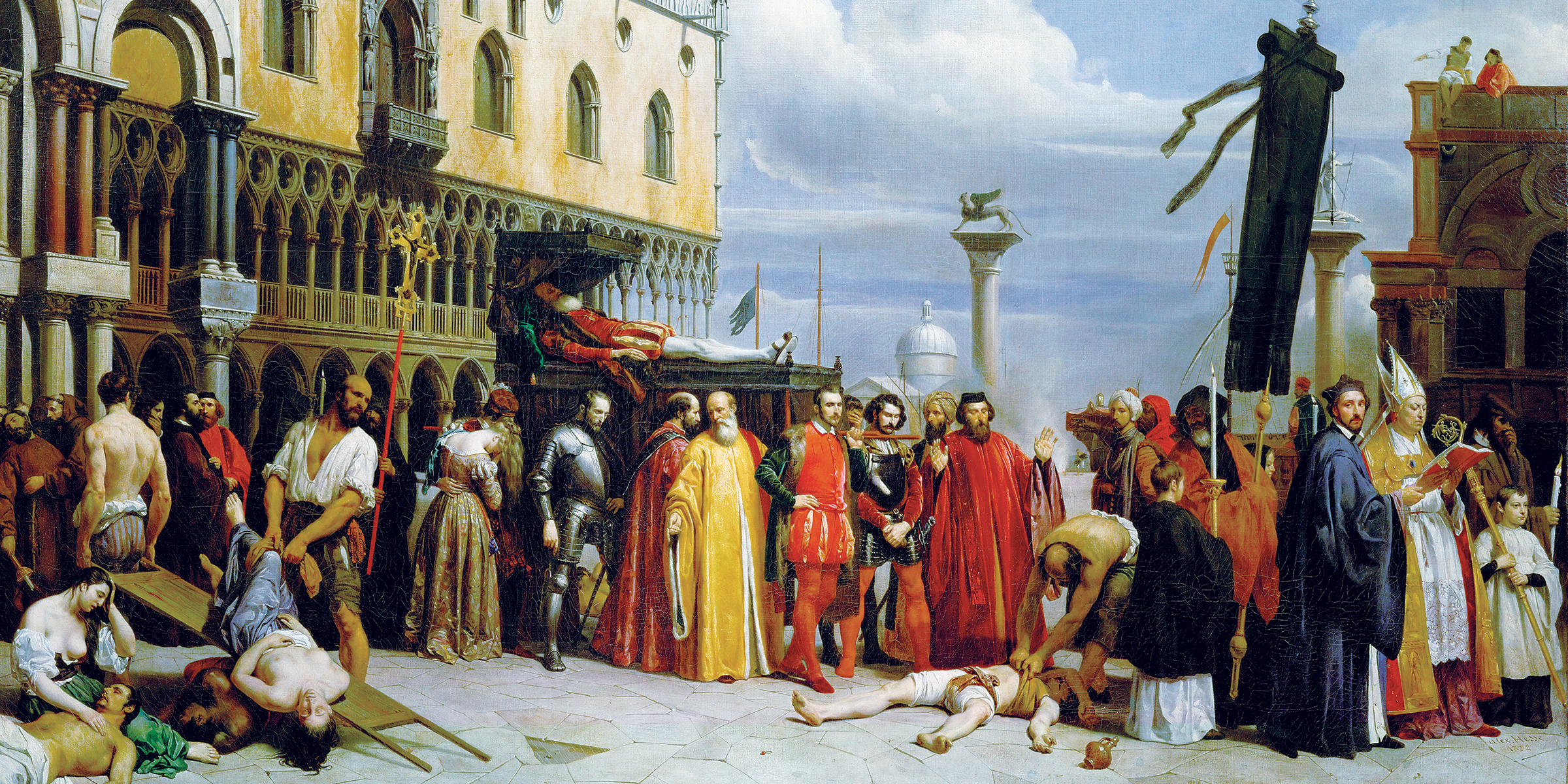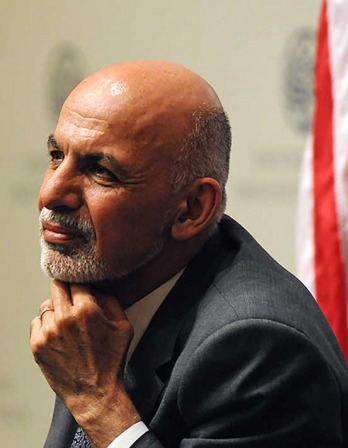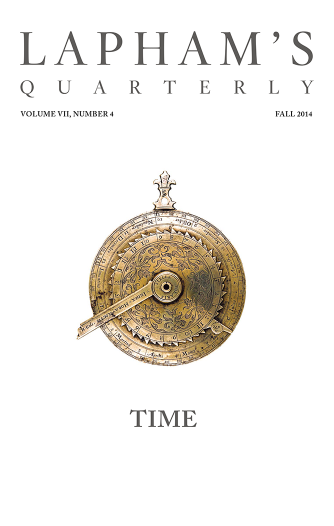Once you hear the details of a victory it is hard to distinguish it from a defeat.
—Jean-Paul Sartre, 1951
Battle on the Bridge, by Arnold Böcklin, 1892. © Eric Lessing / Art Resource.
Audio brought to you by Curio, a Lapham’s Quarterly partner
The rise of ISIS is intensely unsettling to the liberal West, and not just because of the capacity the jihadist group has demonstrated to launch a mass-casualty terrorist attack in a major European city. The group’s advance confounds the predominant Western view of the world. For the current generation of liberal thinkers, modern history is a story of the march of civilization. There have been moments of regression, some of them atrocious, but these are only relapses into the barbarism of the past, interrupting a course of development that is essentially benign. For anyone who thinks in this way, ISIS can only be a mysterious and disastrous anomaly.
For those baffled by ISIS, however, it cannot be only ISIS that is mysterious. So too must be much of modern history. ISIS has brought with it many atrocious assaults on civilized values: the sexual enslavement of women and children; the murder of gay men; the targeted killing of writers, cartoonists, and Jews; indiscriminate slaughter at a rock concert; and what amounted to the attempted genocide of the Yezidi. All of these acts of barbarism have modern precedents, many of them in the past century. The use of sexual violence as a military strategy featured in ethnic cleansing in Bosnia in the 1990s; during Bangladesh’s war of independence in 1971; in Nepal, Colombia, Sudan, the Democratic Republic of Congo, and many other conflict zones. The destruction of buildings and artworks, which ISIS has perpetrated at the ancient site of Palmyra among other places, has several twentieth-century precedents. Vladimir Lenin’s Bolsheviks razed churches and synagogues in Russia. Mao Zedong demolished large parts of China’s architectural inheritance and most of Tibet’s, while the Pol Pot regime wrecked pagodas and temples and aimed to destroy the country’s cities. In these secular acts of iconoclasm, the goal was to abolish the past and create a new society from “year zero”—an idea that goes back to “year one” of the calendar introduced in France in 1793 to signal the new era inaugurated by the French Revolution. Systematically destroying not only pre-Islamic relics but also long-established Islamic sites, the aim of ISIS is not essentially different.
Nor is ISIS so different in its methodical use of terror as a means of consolidating its power. In his “Hanging Order” telegram of August 11, 1918, Lenin instructed communists to execute refractory peasants by public hanging: “This needs to be accomplished in such a way that people for hundreds of miles around will see, tremble, know, and scream out.” From its beginning and throughout much of its existence, the Soviet state relied on fear for its hold on power. The show trials of the 1930s continued a Bolshevik pedagogy that inculcated obedience by way of spectacular terror. Yet the system endured for nearly three-quarters of a century, much of the time commanding a significant following in the West. No doubt the regime had flaws, some hideous, but these were regarded as inheritances from tsarist and Asiatic despotism. A more plausible view would be that Soviet crimes came chiefly from implementing a modern European tradition of using terror to remodel society, emerging with the Jacobins in the aftermath of the French Revolution, which Lenin avowedly followed. But this view was rarely considered.
For those who find the rise of ISIS baffling, much of the past century can only be retrogression from modern life. Even the regime that committed a crime with no precedent in history must be regarded as an example of atavism: the Nazi state has often been described as having taken Europe back to the Dark Ages. Certainly the Nazis exploited a medieval Christian demonology in their persecution and genocide of Jews, but Nazism also invoked a modern pseudoscience of race to legitimate these atrocities. Invoking a type of faux Darwinism, Nazi racism could have emerged only in a time shaped by science. Nazism was modern not just in its methods of killing but also in its way of thinking.
This is not to reiterate the claim—made by Marxian theorists of the Frankfurt School—that modern scientific thinking leads, by some circuitous but inevitable route, to Nazism and the Holocaust. It is to suggest that when it is invoked in politics modernity is a figment. The increase of knowledge in recent centuries is real enough, as is the enlargement of human power through technology. These advances are cumulative and accelerating and, in any realistically likely scenario, practically irreversible. But there have been few, if any, similar advances in politics. The quickening advance of science and technology in the past few centuries has not gone with any comparable advance in civilization or human rationality. Instead, the increase of knowledge has repeatedly interacted with human conflicts and passions to produce new kinds of barbarism.
Using the most advanced technologies to demonstrate its transgression of civilized norms, ISIS is a peculiarly modern form of barbarism. Of course, the group exhibits distinctive features. The Paris attacks show that, more than any other jihadist group, ISIS has the capacity to meld urban terrorism and guerrilla warfare into a unified strategy. Any setbacks ISIS suffers on the battlefield in Syria and Iraq are likely to evoke further attacks on civilian populations in Western cities. ISIS distinguishes itself from other jihadist groups in publicizing its atrocities through the sophisticated use of electronic media. Applying techniques presented in a handbook, The Management of Savagery, published online in 2004, these atrocities implement a carefully planned strategy (one that has provoked criticism from Al Qaeda, from which ISIS emerged as a spin-off). Again, ISIS differs from other jihadist groups in its lack of specific demands. While Al Qaeda aimed to force the U.S. to withdraw from the Middle East, ISIS is dedicated to the destruction of the entire existing world order—a goal that suggests the group is more eschatological in its view of the world than its current jihadist rivals. None of these features go any distance toward showing that ISIS is other than modern. A transnational crime cartel, rapidly expanding apocalyptic cult movement, and worldwide terror network, ISIS could have emerged only in modern conditions of globalization.
Theories of modernization have a common form: only one type of society can truly meet the needs of a society based on continual scientific and technological innovation. The trouble is that these theories specify incompatible types of social and political order. The nineteenth-century sociologist Herbert Spencer believed that only laissez-faire capitalism could fit the bill. In contrast, Spencer’s one-time disciple, the sociologist Beatrice Webb, came to believe that a type of collectivism prefigured in Stalin’s Russia was the next stage in modern development. In our own day, both neoconservatives and progressives have accepted the view propounded by Francis Fukuyama that only “democratic capitalism” can satisfy modern needs—a prognostication that is likely to prove no better founded. Modernity in politics is a species of phantom, constantly elusive because it is continuously mutating.

Funeral Honors Rendered to Titian After His Death at Venice During the Plague of 1576 (detail), by Alexandre Hesse, 1833. Musée du Louvre. © Erich Lessing / Art Resource, NY.
A pursuit of this ghost has shaped the ruinous “war on terror.” The course of the Iraq war illustrates some of the consequences. The effects on the West, which included a colossal waste of resources and the rehabilitation by the Bush administration of the barbarous practice of torture, are by now well known. Less well understood is the fact that disaster in Iraq flowed not only from mistakes in policy (grotesque as some of these were) but also from the attempt to remake the country as a democracy. The state of Iraq was built by the British from provinces of the Ottoman Empire by applying a divide-and-rule strategy that meant Iraq’s governance could never be democratic. One of the state’s chief architects, the British colonial officer, archaeologist, and scholar Gertrude Bell, wrote: “I don’t for a moment doubt that the final authority must be in the hands of the Sunnis, in spite of their numerical inferiority. Otherwise you’ll have a mujtahid-run theocratic state, which is the very devil.” Formulated some eighty years before the American-led attack, Bell’s analysis has been amply confirmed by events.
The invasion that toppled Saddam Hussein in April 2003 destroyed the state of Iraq. Partly this was because of the policies of the occupying power, such as disbanding the Iraqi army in May 2003, a bizarre exercise that had far-reaching consequences. A more fundamental reason was the fact that the integrity of the state rested on Sunni hegemony, which the occupation undid. Iraq was a multiethnic and multisectarian state held together principally by force. Self-government for “the Iraqi people” was impossible, since nothing of the kind had ever existed. The only realistically imaginable outcome of regime change was the violent disintegration of the state.
Since the American-led invasion, three new states have emerged in Iraq: the Islamic State (as the territorial unit of ISIS is sometimes called), which is ruled according to ISIS’s extreme interpretation of Sunni Islam; a de facto Kurdish state in the north of the country; and a Shia state headquartered in Baghdad that operates in an expanded zone of Iranian influence in what remains of the historic state of Iraq. Of the three, only that of the Kurds can claim to be anything like the modern secular democracy that regime change was supposed to install. In most of Iraq, the result of attempting to install democracy has been to empower theocracy—just as Bell predicted.
Saddam’s Iraq was ruled according to the ideology of Baathism, a secular and modernizing creed in which a revolutionary vanguard uses the state to effect progress in society. Clear links can be traced between the destruction of Baathist Iraq and the rise of ISIS. Disbanding the army provided a source of recruitment for ISIS commanders, while the ensuing breakup of the state created zones of anarchy into which ISIS could expand. Without the American-led invasion of Iraq, ISIS would most likely not exist. The effect of regime change in Iraq was to destroy a modern secular despotism and empower a type of theocracy that is also modern. ISIS’s ideology is a version of Wahhabism, a highly repressive type of Sunni fundamentalism that developed during the eighteenth century in a region of what is now Saudi Arabia. Fundamentalism looks to the lost purity of an imaginary past; but in that they thrive in societies whose traditions are in disarray because of an encounter with new technologies and economic forces, fundamentalist movements are themselves essentially modern. Adopted as the official religion when the present Saudi state was founded in 1932 and promoted throughout the world in recent decades using the kingdom’s oil wealth, Wahhabist ideas have been a powerful means of recruitment to jihadist groups in societies where inherited patterns of life have been disrupted.
Drawing on the apocalyptic traditions of medieval Islam, ISIS exhibits many affinities with the millenarian movements that ravaged Europe in the late Middle Ages. That does not make ISIS a rerun of medieval beliefs and values, for modern history abounds with movements driven by apocalyptic myths. As Norman Cohn argued in his seminal study The Pursuit of the Millennium, twentieth-century totalitarian movements were fueled by secular versions of end-time myths. Cohn applied his analysis chiefly to Communism and Nazism, but later events suggest it can be applied more widely. From American flying-saucer cults to the bioterrorist Aum Shinrikyo cult in Japan, there have been many examples of movements that have reframed apocalyptic beliefs in ersatz-scientific terms. Though its eschatological beliefs are explicitly religious, ISIS is the latest example of a recurring modern phenomenon.
While much remains unknown, there is nothing mysterious in the rise of ISIS. It is baffling only for those who believe—despite everything that occurred in the twentieth century—that modernization and civilization are advancing hand in hand. In fact, now as in the past some of the most modern movements are among the most barbaric. But to admit this would mean surrendering the ruling political faith, a decayed form of liberalism without which Western leaders and opinion formers would be disoriented and lost. To accept that liberal societies may not be “on the right side of history” would leave their lives drained of significance, while a stoical response—which is ready to fight while being doubtful of ultimate victory—seems to be beyond their powers. With mounting bewilderment and desperation, they cling to the faith that the normal course of history has somehow been temporarily derailed.

Battle between Roman and Germanic armies, detail of the Portonaccio sarcophagus, Rome, c. 180. © Gianni Dagli Orti / The Art Archive at Art Resource.
It is chiefly this faith that has driven the West’s interventions in countries such as Iraq, Libya, and Syria. The decision to topple Muammar Qaddafi in 2011 has left Libya an anarchic hellhole fought over by rival jihadist groups, fueling flows of migrants into Europe—some of whom must surely themselves be jihadists. Yet the West has continued its efforts to engineer the overthrow of Bashar al-Assad in Syria—a project that would create anarchy on an even larger scale. Only in the wake of the Paris attacks have Western governments begun to accept that dealing with ISIS may require a coalition of forces that include Assad’s army and Russian air power. Even now they continue to insist Syria can be restored to its historic shape while being reconstituted as a democratic polity under the rule of “moderate forces.” Yet to the extent that such forces actually exist, they are small in number, divided among themselves, and incapable of fighting ISIS and Assad simultaneously. As in Iraq and Libya, regime change in Syria would inexorably produce the collapse of the state, with ISIS being a beneficiary of the resulting anarchy.
Assessed by reference to any kind of strategic rationality, the West has displayed unfathomable stupidity. To invade a country, dismantle its institutions, create a failed state, exit from the ensuing chaos, and then return with unending bombing campaigns is imbecility of an order that has few historical parallels. To persist in this behavior after so many catastrophes betrays something other than mere imbecility, however extreme. Behavior of this kind looks more like an extreme version of cognitive dissonance—an attempt to expel disastrous facts from the mind. In an obsessive effort to remake the world according to an idealized image of their own societies, Western leaders have renounced a sense of reality. Each attempt only reinforces the fact of their impotence. Obeying a kind of repetition compulsion, they have found themselves returning again and again to the intractable actuality they are so anxious to avoid.
The prevailing mode of liberal thinking filters out any fact that might disturb its tranquility of mind. One such fact is that toppling despots does not of itself enhance freedom. If you are a woman, gay, a member of a religious minority, or someone who professes no religion, are you freer now in Iraq, Libya, or most of Syria than you were under the dictatorship of Saddam, Qaddafi, or Assad? Plainly, you are much less free. Another uncomfortable fact is that tyrants are often popular. According to today’s liberals, when large numbers of people flock to support tyranny it cannot be because they do not want to be free. They must be alienated from their true nature as human beings. Born liberals, human beings become anything else as a result of social conditioning. Only cultural and political repression stands in the way of liberal values becoming a universal way of life.
This strange metaphysical fancy lies behind the fashionable theory that when people leave advanced countries to join ISIS they do so because they have undergone a process of “radicalization.” But who radicalized the tens of millions of Europeans who flocked to Nazism and fascism in the interwar years? The disaster that ensued was not the result of clever propaganda, though that undoubtedly played a part. Interwar Europe demonstrates how quickly and easily civilized life can be disrupted and destroyed by the impact of war and economic crisis.
Civilization is not the endpoint of modern history, but a succession of interludes in recurring spasms of barbarism. The liberal civilization that has prevailed in some Western countries over the past few centuries emerged slowly and with difficulty against the background of a particular mix of traditions and institutions. Precarious wherever it has existed, it is a way of life that has no strong hold on humankind. For an older generation of liberal thinkers such as Alexis de Tocqueville and Isaiah Berlin, these were commonplaces. Today these truisms are forbidden truths, which can no longer be spoken or in many cases comprehended.
I think we are inexterminable, like flies and bedbugs.
—Robert Frost, 1959Liberal civilization is not the emerging meaning of the modern world but a historical singularity that is inherently fragile. This is why it is worth preserving. Defending this form of life against ISIS requires a clear perception that the jihadist group is not an atavistic force that—with a little assistance from intensified bombing—will fade away with advancing modernization. If the threat is to be removed, ISIS will have to be defeated and destroyed.
The simpleminded reasoning that rejects any Western military action on the grounds that earlier interventions were counterproductive fails to take the measure of the challenge that ISIS now poses. The Paris attacks, which appear to have been a response to defeats in the field, show that the state that ISIS has created cannot simply be contained. Nor would containment be enough in ethical terms, since ISIS has demonstrated a capacity for genocide. But the aim must not be to replace ISIS’s theocratic totalitarianism with a replica of liberal democracy—a delusional project that has unleashed the forces by which we are now besieged. A functioning state that enjoyed a reasonable measure of local support and could keep the peace would be a sufficiently challenging objective for Western policy.
Whether the West is up to the task is unclear. The practical difficulties are formidable. After the fiasco in Iraq, putting large numbers of troops on the ground hardly seems possible for any Western government, while the regional powers that need to be part of any concerted military action—Turkey, the Kurds, the Saudis, and Iran—are pursuing their own goals and rivalries. Russia, too, has its own agenda. Everyone is threatened by ISIS, but no one has yet made fighting it their first priority.
The intellectual difficulties are greater, and possibly insuperable. For many in the West, the threat ISIS poses to their view of the world seems a greater disaster than the atrocities ISIS has committed and threatens to repeat. The bafflement with which the West approaches the group is a symptom of the senility of the liberal mind, a condition for which there is no obvious remedy. Perhaps what our culture lacks, in the end, is the ability to understand itself.




